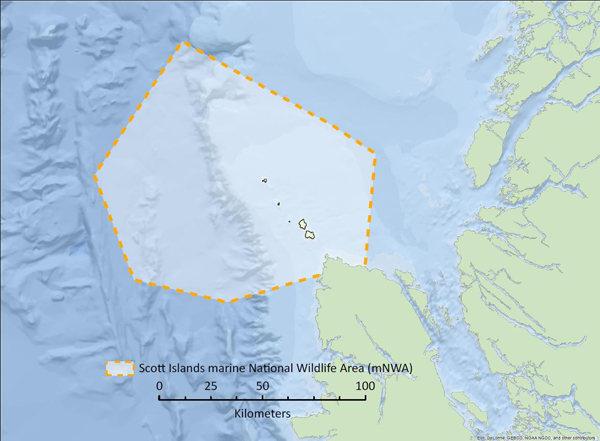Vancouver, BC – The Canadian Parks and Wilderness Society (CPAWS) welcomes today’s announcement regarding the establishment of Scott Islands marine National Wildlife Area (mNWA). This announcement comes after nearly 17 years of consultation with federal, provincial, and First Nations governments, as well as various stakeholder groups, including CPAWS. As Canada’s first marine National Wildlife Area, its aim is to protect and conserve the millions of seabirds and other marine life that breed, forage, and overwinter at the Scott Islands.
“CPAWS first called government attention to the need to protect the Scott Islands marine area in the early 1990s, and we have been working ever since to get to this day,” said Sabine Jessen, CPAWS’ National Director of the Ocean Program. “We are pleased to see that the government has addressed our recommendations including the commitment of significant new funding,” Jessen added. “We look forward to working with all levels of government to ensure that the necessary next steps are taken toward more effective protection of these habitats and their biodiversity.”
At 11,540 km2, the Scott Islands mNWA is designated to protect the foraging and breeding habitats of numerous seabird populations. Based on the final regulations, bottom trawl fishing, a particularly ecologically harmful method, is restricted in only 80% of the area, with additional restrictions placed on forage fish and gill net fisheries, activities that do not currently occur within the boundaries.
“While the establishment of the Scott Islands mNWA is an encouraging step, further efforts are needed to ensure protection for this rich marine ecosystem is enhanced,” said Ross Jameson, Ocean Conservation Manager, CPAWS-BC. “Commitments towards effective conservation measures such as bottom trawl fishing restrictions and no-go shipping buffers need to be completed, expanded and added to in the near future to achieve strong and effective protection for the Scott Islands mNWA and its feathered friends,” cautions Jameson.
Scientific research shows that bycatch and entanglement from fishing activities and disturbance by shipping activity are harmful to birds and other marine species. The Government of Canada is committing to further research and management measures to address some of the outstanding concerns from conservation groups and CPAWS is looking forward to working with them to achieve these outcomes.
“We also want to take this moment to applaud and thank Shell Canada for relinquishing their exploratory permits in the area. This is a very significant step and means that oil and gas activities will not be a future threat to this area,” said Jessen. “We are also very pleased by the
government’s commitment to consider expanding the Scott Islands, as there are important seabird areas that should be included in the mNWA,” said Jessen.
“While we acknowledge the government’s steps to increase ocean conservation, we will continue to emphasize the critical importance of the quality of protection if biodiversity is to be conserved over the long term,” said Jessen. “We will keep working to advance increased protection for the Scott Islands as well as for other vulnerable ecosystems throughout Canada’s ocean estate, and look forward to the recommendations of the National Advisory Panel on MPA standards.”

For more information contact:
Sabine Jessen, National Director, Ocean Program, CPAWS
sabine@localhost | 604-657-2813
Ross Jameson, Ocean Conservation Manager
[email protected] | (604) 685-7445 ext. 29
Background
Located off the northern tip of Vancouver Island, the Scott Islands are the most important seabird breeding area in Pacific Canada. They are home to 90% of Canada’s tufted puffins and half of the world’s Cassin’s auklets. The nutrient-rich ocean waters which surround the islands create productive feeding grounds that support a great diversity of marine life, including sea otters, Steller sea lions, and several species of whales. The Scott Islands are an internationally recognized Important Bird Area, while the marine area has been identified as an Ecologically and Biologically Significant Area by Fisheries and Oceans Canada.
